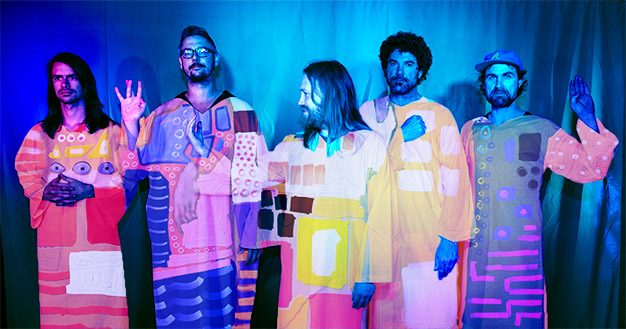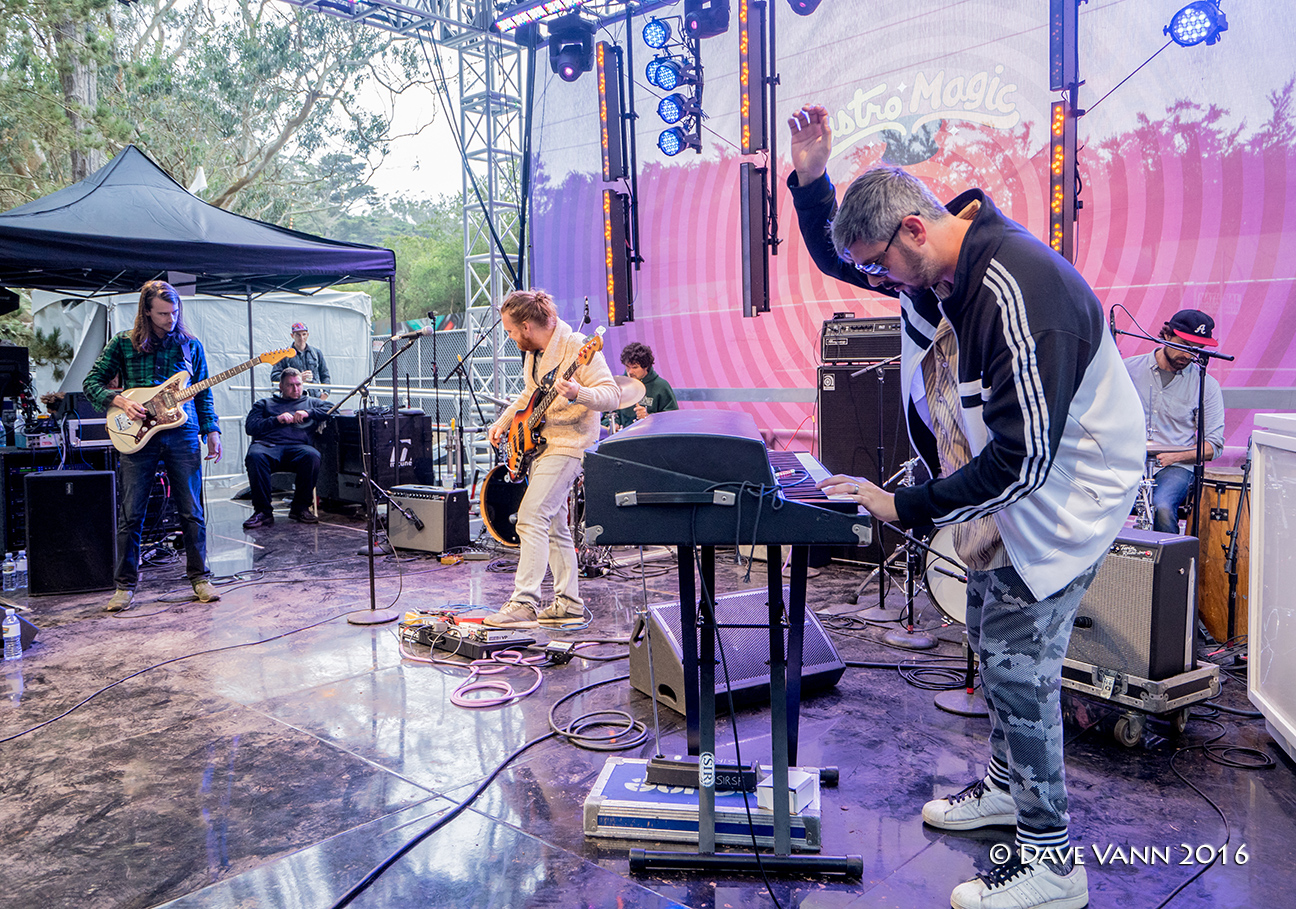Interview: Reed Mathis on Electrifying Beethoven
 Reed Mathis grew up in a family of classical musicians. His parents, grandparents and a number of aunts and uncles all pursued careers in the arts. But while the Oklahoma-raised Mathis shared their passion for producing sublime sounds, he gravitated toward jazz and rock orbits rather than exploring paths that would lead to an orchestral career.
Reed Mathis grew up in a family of classical musicians. His parents, grandparents and a number of aunts and uncles all pursued careers in the arts. But while the Oklahoma-raised Mathis shared their passion for producing sublime sounds, he gravitated toward jazz and rock orbits rather than exploring paths that would lead to an orchestral career.
The accomplished bass player was a founding member of the innovative, ever-evolving Jacob Fred Jazz Odyssey, a group he first joined as a high-school student. He remained with JFJO through 2008, when he left the Tulsa-based collective to commit full-time to San Francisco rock group Tea Leaf Green. Mathis transplanted himself to the Bay Area and also found time to perform with the Marco Benevento Trio and join two projects with Bill Kreutzmann: 7 Walkers and Billy & The Kids.
This past August, Mathis announced his departure from Tea Lea Green in order to explore a new endeavor, which he dubbed Electric Beethoven. Over the preceding few years, he’d recorded Beethoven’s third and sixth symphonies with a variety of other artists in three-piece parings, including: Page McConnell and Jason Smart, Mike Gordon and Joe Russo, Marco Benevento and Matt Chamberlain, Brad Barr and Andrew Barr, and Stanton Moore and Robert Walter.
Now, Mathis is taking the project on the road with the help of drummer Jay Lane (RatDog, Primus), keyboardist Todd Stoops (RAQ) and guitarist Clay Welch. The group uses Beethoven as a launching point for a heavily improvisational sound described as CDM (classical dance music).
As Mathis explains, “What we’re doing live is not really what you hear on the record. What we’re doing live is basically coming up with grooves as a group— dance units that we feel are hidden in Beethoven’s chord progressions. This is the most engaged with the room I’ve ever had the privilege to be. In Jacob Fred, the improvising felt like being a ship at sea. We were interacting with the waves of the ocean and just trusting the audience to jump in the boat with us. With Tea Leaf Green, they had been playing for 12 years before I even met them, so they had a really established pattern and relationship that I was basically doing a variation on. It was the kind of thing where, because I hadn’t been there when that music was birthed, they couldn’t really follow me, but I could follow them in new ways, so the improvising was really like looking through a telescope on the wrong end. Along those lines, I think the audience was confused some of the time.”
In order to offer a new spin on Beethoven’s symphonies, Mathis hand-picked musicians who shared a certain set of emotional, physical and musical traits. “We’re feeling our way toward grooves and we trust the audience to help us do it,” he says. “For the first time in my life, I’m really able to open up to the whole room and allow the people in the room to be in the band and improvise with us and shape and navigate what’s happening on the dance floor. It’s a situation where the musicians have to be honest and have to be willing to fail and trust one another and forgive one another. We have to be brave and be curious, which is what we’re asking the audience to do every night. Those people who are showing up are taking a huge risk. The least we can do is be as brave and as curious as the audience is.”
I imagine you heard your fair share of Beethoven growing up. What led you back to him for this project?
When I was a kid, we didn’t even have the radio on; we would mostly listen to my parents’ classical vinyl collection. I didn’t like most of it but, occasionally, some of it would grab my attention and I’d be like, “Dad, what’s this? What’d you put on?” and he would say, “Beethoven.” Eventually, I started noticing that every time I said, “What did you put on?” it was Beethoven, so I realized, “There’s something about that guy.”
I couldn’t figure it out until much later, after I was pretty serious about music already, and was like, “What’s different about that?” Jacob Fred had already put out a couple of records and I had been going real deep on studying the life of John Coltrane and Jimi Hendrix, and we’d been opening for Medeski Martin & Wood— this was back in, like, ‘95. I was getting turned on to this other level of improvised music that, in my opinion, even transcends genre. You can’t really say that Coltrane is jazz or MMW is funk. It’s like these guys took the blue pill and now they’re past genre; they’re doing something that can’t be described. 
One day, John Medeski was talking to me about Beethoven. I was like 18 and he was 30 when we started touring with them, and I can’t believe how patient he was with me because I was like, “Hey, I got a question. Hey, do you ever… Hey!” because I had never been on tour before. I had just gotten out of high school. I heard him talking about Beethoven and I asked him some questions. My grandfather had given me a book called Beethoven: His Spiritual Development, from the 1920s. It had been sitting on my shelf for years and when I got home from tour, I read it and it was incredible. It could’ve been a book about Coltrane or Bob Marley—one of these people who became a conduit, who started out a normal person and somehow became a channel for something universal. His music had never been presented to me that way. I always just lumped it in with all other classical music.
So I read this book and I put on the third symphony. I remember the night like it was yesterday. I got super high and lit candles, and the third symphony made me feel like I was listening to a live Hendrix show. I started thinking, “There’s got to be a way to play this music like he did.” I always think of how Hendrix took up the electric guitar, but not like we do—when he picked it up, it was brand-new technology. It was 1958. He was basically picking up the absolute most modern technology and figuring out a new way to use it.
That’s what Beethoven did, except now when you hear his music, people are doing a reenactment, almost like a skit of what happened 200 years ago, which is the opposite of who he was. People present Beethoven’s music like it’s theater—like it absolutely has to be these instruments and it has to sound like this and you have to have a certain pedigree and you actually have to get permission from some authority to play this shit in the first place. And Beethoven was not that kind of guy. I read a dozen more books on him, and it became a quest for me to give Beethoven back his music—take it out of the hands of the re-enactors.
Although people often think of jazz in a particular way, back in the 1950s and ‘60s, artists like Miles Davis, Sonny Rollins and Cannonball Adderley would rearrange Broadway tunes like “The Surrey with the Fringe on Top.” What are your thoughts on how that came together and what it represented?
Well, “jazz,” to me, can mean two different things. It refers to an era and everything that goes along with that era. A lot of people who play jazz play it a certain way, and they play stuff from a certain time period and use instruments that were popular during a certain time period. So the audience expects: “Oh, we’re going to see a jazz band. They’re going to wear suits and they’re going to have a saxophone and a certain type of drum set.” It’s even gotten to the point where people say, “Oh, that’s a jazz drum set,” as if the music has a certain type of drum.
So that’s one way to use the word jazz. The other way to use the word jazz—the way that I use it—is not as a genre; it’s like a martial art that can be applied to any genre. It’s the flower that blooms on any music when it evolves to a certain point, and it means supernova. It means something being born before your eyes. It means something so new that it’s even scary. It means deliberately seeking out virgin territory. It means exploring, it means daring, and that’s not a genre; that’s a stance. You can take that stance in any genre. So, to me, that’s what jazz means.
To me, somebody with a tenor saxophone playing Giant Steps sounds less like John Coltrane than Jimi Hendrix does. Jimi Hendrix sounds more like John Coltrane than some guy with a saxophone playing Coltrane’s solo, note for note. Somebody playing a Katy Perry song on a washtub, and doing something creative with it, sounds more like Jerry Garcia than somebody with one of those guitars with the two outputs playing “Loser” in the exact way. You don’t honor an innovator by copying them. You honor an innovator by innovating.
How do you think Beethoven would receive what you’re doing with the live shows?
I don’t think he would want to go see someone copy what he did 200 years ago. He was the greatest improviser of his generation, but there are no recordings. The stuff that we play is the stuff that he wrote down to sell. He improvised at every performance. The whole reason his career got going was because he was an improviser. He would go on stage after touring musicians and play back whatever they had just played and improvise on it. That was his shtick. In his 20s, he was that guy who would go up there and, almost like a rodeo clown, sort of humiliate whoever had just played by playing back whatever they just played, with no music in front of him, and improvise on that form doing variations.
 He’s the guy that would be rolling up and saying, “What’s new here? What can you guys show me that’s new and exciting? What’s pissing off the squares?” He was that guy. That’s why, in his lifetime, he was a local musician. He didn’t play in other countries. He played in Vienna and that was about it. He wasn’t a raging success. It was 50 years after he died that Wagner and Mendelssohn told the world: “Hey, you’ve got to check this guy out.” During his lifetime, he was just a punk.
He’s the guy that would be rolling up and saying, “What’s new here? What can you guys show me that’s new and exciting? What’s pissing off the squares?” He was that guy. That’s why, in his lifetime, he was a local musician. He didn’t play in other countries. He played in Vienna and that was about it. He wasn’t a raging success. It was 50 years after he died that Wagner and Mendelssohn told the world: “Hey, you’ve got to check this guy out.” During his lifetime, he was just a punk.
And that’s even before he went deaf. After he went deaf, it just got even weirder because he began studying Indian music and African music and reading the Bhagavad Gita. He started writing stuff that was decidedly not European, but was truly amazing music. He was incorporating dance elements. He was incorporating vamps and backbeats and polyrhythms and claves and all this stuff that white culture had never heard of. They didn’t think, “Oh, wow, how marvelous, how innovative.” They thought, “Oh, isn’t that sad. He’s deaf. He can’t hear how shitty his music is.” My dad has this book that’s a collection of Beethoven’s reviews—eyewitness accounts and newspaper clippings—and it is astonishing to see what they said about him during his lifetime. The music press was extremely dismissive. The more creative and innovative his music got, the more they blamed it on him being deaf.
But now, we put on the ninth symphony—he’d been deaf for 25 years when he wrote that— and it sounds like God having an orgasm. It doesn’t sound like a mess to us because we understand backbeats and these elements that became American music because his music then traveled to New Orleans and was in everyone’s ear when jazz was born. Then jazz was in everyone’s ear when rock-and-roll was born and, now, we take for granted all those things that Beethoven was able to pioneer and unite between cultures.
I have a theory that improvising his music in the dialect that we currently use will completely work because we’re still doing the stuff that he was experimenting with. His experiment worked; he just didn’t live long enough to see it. His music traveled to America and then continued to morph, and we’re the proof.
Stanton Moore, who appears on your album, has also described a connection between New Orleans sounds and Beethoven.
When I started putting this project together and contacting my friends and seeing who was down to give it a shot, I called Stanton and he was like, “That’s so funny—I was just talking about Beethoven earlier today in a drum club,” and I said, “You were? What do you mean?” He told me: “I mean, the second-line rhythm, the rhythm that’s most associated with New Orleans drumming, is all over Beethoven’s music.” Then, he started sending me examples and I was like, “Holy fuck, I called the right guy because that’s exactly what I’m trying to demonstrate and celebrate.”
Some music has the potential to be evergreen. I believe the Grateful Dead’s music is evergreen. I think that Bob Dylan’s music is evergreen. I think that Radiohead’s music will definitely stand the test of time, and Duke Ellington and Miles Davis and those weirdos. There’s just some music that will only go away if we stop watering it. And I think that Beethoven’s music is up there, and not because it’s fancy but quite the opposite. It’s universal.



















